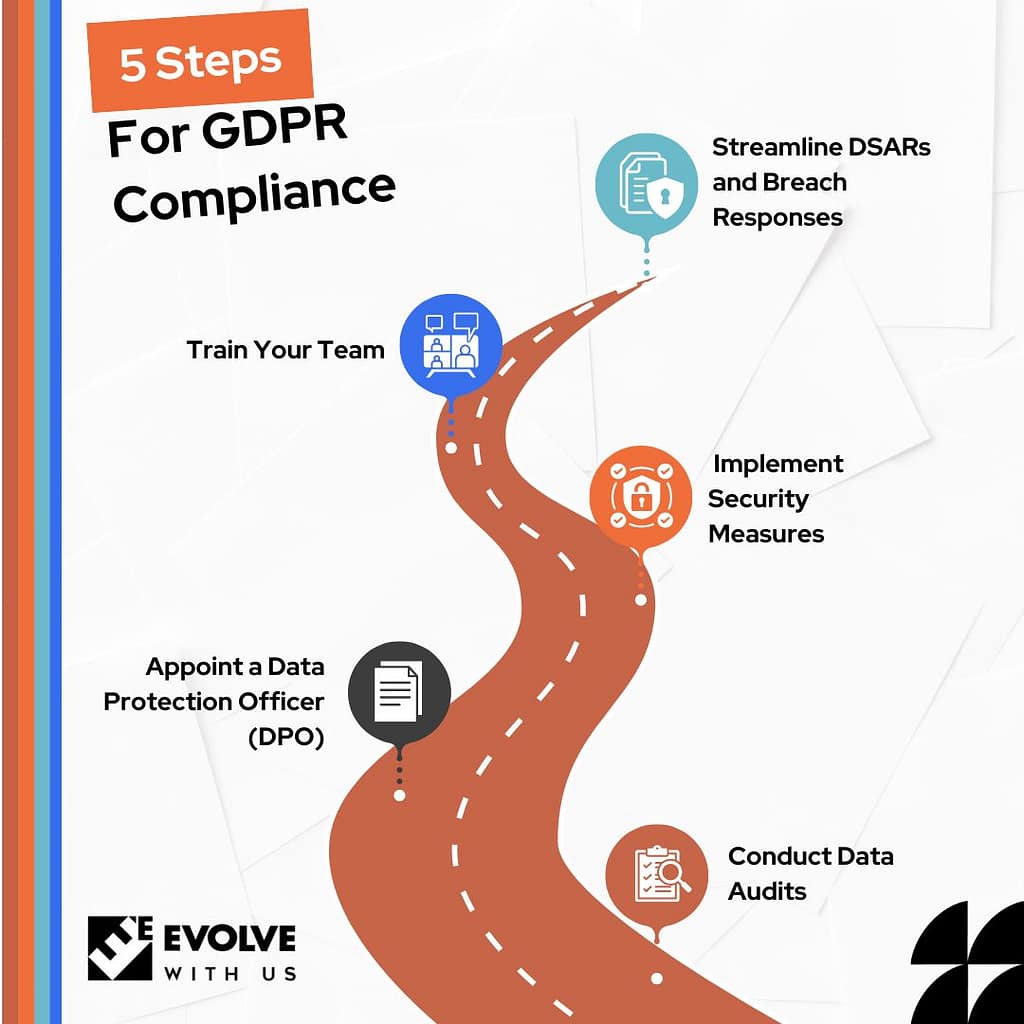Navigating GDPR compliance might seem like a labyrinth of regulations, but for directors and decision-makers across the EU, it’s an indispensable part of safeguarding both reputation and customer trust. As data privacy evolves in response to shifting regulations and technologies like AI, understanding the nuances of GDPR compliance becomes ever more critical.
In 2025 & beyond, with new legal frameworks such as the EU Data Privacy Framework and updates to AI-related data governance, directors face challenges that go beyond simply “ticking the box.”
Balancing legal obligations, cross-border complexities, and the practicalities of implementation demands both strategic oversight and a commitment to continuous learning.
This article will illuminate the key challenges, practical steps, and why staying informed is a director’s best defense against compliance pitfalls, offering actionable insights to keep your organization aligned with GDPR’s gold standard.
What is GDPR, and Why Does It Matter?
The General Data Protection Regulation (GDPR) is a European Union (EU) law introduced in May 2018 to safeguard personal data and strengthen individuals’ privacy rights.
It replaced older laws that hadn’t kept pace with digital advancements. GDPR applies not only to businesses within the EU but also to companies outside the EU if they handle data belonging to EU residents.
This global reach means businesses worldwide must comply if they operate in Europe or collect data from its citizens.
The Key Objectives of GDPR:
- Empower individuals: GDPR gives people more control over how their data is used. For example, individuals have the “right to be forgotten,” meaning they can ask businesses to delete their data when it’s no longer needed.
- Increase transparency: Companies must clearly explain why they are collecting data and how it will be used.
- Enhance security: Businesses must safeguard personal data and promptly report breaches to authorities
GDPR Impact on Businesses:
- Global compliance: Companies worldwide must adapt their practices if they process EU citizens’ data.
- Consent-driven: Businesses need explicit consent from users to collect and process their data.
- Heavy penalties: Non-compliance can result in fines up to €20 million or 4% of global annual revenue, whichever is higher
Real-World GDPR Stakes:
High-profile cases have shown the severe consequences of violating GDPR. For instance:
- British Airways was fined £20 million for insufficient security measures leading to a data breach.
- Meta (formerly Facebook) faced a €265 million fine for exposing user data.
GDPR creates a safer and more transparent digital world by ensuring stricter rules around data use and giving consumers more power. However, it also challenges businesses to rethink their data practices and invest in robust compliance measures.
The Key Principles of GDPR for Directors
1. Transparency
Transparency is the foundation of GDPR compliance. Directors must ensure clear, honest communication about data collection and usage with all stakeholders.
Policies should explicitly state what data is collected, why, and how it will be processed. This openness not only fulfills GDPR requirements but also strengthens stakeholder trust and credibility in business operations.
2. Purpose Limitation
Data must only be collected for specific, legitimate purposes that are disclosed upfront. If a secondary purpose arises, ensure it aligns with the original intent or obtain explicit consent.
This principle safeguards against data misuse and ensures ethical data practices, a key consideration for corporate governance.
3. Data Minimization
Collect only the data absolutely necessary to achieve the stated purpose. Excessive data collection increases risks and storage costs while exposing the organization to regulatory penalties.
Regular audits to evaluate the relevance of stored data can streamline compliance efforts and enhance operational efficiency.
4. Accuracy
Maintaining accurate data is critical. Directors should champion mechanisms to keep data up-to-date and rectify inaccuracies promptly.
This minimizes the risk of decision-making errors and ensures compliance with individuals’ right to correct inaccurate data. It is a reflection of corporate integrity and operational precision.
5. Storage Limitation
Data should be retained only as long as necessary for its intended purpose. Define clear data retention policies, document the justification for retention periods, and establish deletion protocols for obsolete data.
Overstaying data not only violates GDPR but also burdens operational resources and complicates incident response.
6. Integrity and Confidentiality
Security measures must protect data against unauthorized access and breaches. This includes robust cybersecurity policies, encryption, and training employees on handling sensitive information.
A proactive stance on data security reinforces compliance and reduces reputational risk from potential breaches.
For directors, these principles are not just regulatory requirements but also strategic pillars that enhance trust, operational efficiency, and corporate responsibility.
Challenges Faced by Directors in Ensuring GDPR Compliance in the EU
Guaranteeing GDPR compliance across the European Union presents directors with unique and evolving challenges due to the complexity of data protection regulations and the global scope of data flow. Top challenges include:
1. Managing Extensive Data Across Jurisdictions
Directors in the EU must navigate diverse regulatory frameworks, especially when operating across multiple member states. Compliance often involves adapting to local interpretations of GDPR while ensuring consistency across the organization.
Furthermore, emerging frameworks such as the EU-US Data Privacy Framework introduce additional requirements, making data management more intricate.
2. Evolving Regulatory Landscape
With constant updates to GDPR enforcement and the introduction of supplementary privacy laws in other regions, directors face difficulty staying ahead of legal requirements.
Enhanced scrutiny by EU supervisory authorities, combined with efforts like the European Data Protection Board‘s enforcement actions, add to the pressure to maintain up-to-date policies and practices.
3. Staff Awareness and Implementation
Many organizations report challenges in fostering GDPR awareness among employees. Training programs must be robust and continuous, as lapses in understanding can lead to non-compliance.
A lack of well-defined roles or insufficient resources for Data Protection Officers (DPOs) has also been highlighted as a key issue.
4. Balancing Compliance with Business Efficiency
Compliance measures, while essential, can disrupt business operations if not efficiently integrated. Directors must find ways to align GDPR requirements with business goals without introducing inefficiencies.
This includes balancing the need for data minimization with the operational necessity of leveraging customer data for insights.
5. Cybersecurity Threats
Data breaches and unauthorized access represent significant risks. Directors must invest in proactive cybersecurity measures, such as penetration testing and data encryption, to safeguard sensitive information while meeting GDPR’s integrity and confidentiality principles.
Summary Table: GDPR Challenges for EU Directors
| Challenge | Impact | Solution |
| Cross-Jurisdictional Data | Complexity in managing diverse legal standards | Leverage compliance platforms for harmonization |
| Regulatory Updates | Risk of outdated compliance practices | Regular updates and audits of privacy policies |
| Employee Awareness | Inconsistent adherence to GDPR principles | Comprehensive, ongoing staff training programs |
| Operational Disruptions | Inefficient processes and slowed innovation | GDPR-compliant tools that streamline workflows |
| Cyber Threats | Risk of fines and reputational damage | Implement robust data protection technologies |
A Note for Directors
As data protection laws expand globally, EU directors must view GDPR compliance not only as a regulatory requirement but also as an opportunity to build trust with stakeholders. Emphasizing GDPR Learning for Directors in the EU is critical to overcoming these challenges and achieving sustainable compliance
Practical Steps for GDPR Compliance

Assuring compliance with GDPR is a multifaceted process that requires both organizational commitment and specific actionable steps. Here’s a breakdown of practical measures, complemented by how e-learning solutions can support your efforts:
- Conduct Regular Data Audits
Regularly map out where and how personal data is processed within your organization. This helps identify risks and ensures adherence to GDPR principles like data minimization and purpose limitation.
- Appoint a Data Protection Officer (DPO) if Required
Businesses handling large volumes of sensitive data may need a DPO to oversee GDPR compliance. If not legally required, assigning a data protection lead can still improve accountability.
- Establish Robust Data Security Measures
Implement technical safeguards like encryption, access controls, and secure hosting to protect personal data from unauthorized access or breaches.
- Provide GDPR Training for Staff
Employees must understand their roles in maintaining data privacy. Training programs ensure awareness of legal obligations and foster a privacy-centric culture.
- Develop Clear Procedures for DSARs and Breach Notifications
Prepare workflows for handling data subject access requests and responding to breaches swiftly, as required by GDPR.
The Role of E-Learning in GDPR Compliance
E-learning modules are a valuable tool for reinforcing GDPR knowledge across your organization. They offer the following advantages:
- Comprehensive Training: Modules are often aligned with GDPR articles, ensuring all key aspects are covered.
- Interactive Learning: Tests and feedback mechanisms enhance understanding.
- Accessibility: Courses are scalable, enabling consistent training across teams.
Providers like us and other GDPR-focused e-learning solutions tailor content to address organizational needs, helping staff remain informed and compliant in an evolving regulatory landscape.
By integrating e-learning into your compliance strategy, your organization can efficiently train employees and build a strong foundation for data protection.
Why GDPR Training is a Long-Term Investment
GDPR training is a strategic long-term investment that provides several significant benefits for businesses. Here’s why:
- Improved Operational Efficiency and Reduced Compliance Risks
By training staff on GDPR requirements, organizations can streamline their operations and reduce the risks of costly compliance failures.
GDPR training ensures that employees understand their roles in handling personal data and adhere to security measures. Regular training sessions help reduce mistakes, minimize security breaches, and improve overall workflow. - Enhanced Trust with Customers and Stakeholders
Data protection and privacy are paramount for individuals in today’s digital world. GDPR training helps businesses foster trust with their customers by demonstrating their commitment to safeguarding personal data.
When customers see that an organization takes data protection seriously, they are more likely to engage and remain loyal. This trust translates into better customer retention and stronger relationships with stakeholders. - Competitive Advantage in a Privacy-Focused Market
With increasing awareness of data privacy, businesses that prioritize GDPR compliance stand out in the marketplace.
Adopting strong privacy practices not only ensures compliance but can also be leveraged as a competitive advantage.
Organizations with robust data protection measures are more likely to attract customers who value their privacy, setting them apart from competitors who fail to invest in these practices.
Summary Table: Benefits of GDPR Training
| Benefit | Explanation |
| Operational Efficiency | Reduces compliance risks, streamlines data handling, and minimizes security breaches through well-trained staff. |
| Enhanced Trust | Builds customer loyalty and confidence by showing a commitment to data protection. |
| Competitive Advantage | Differentiates your business in a privacy-conscious market, attracting more customers and stakeholders who value security. |
Investing in GDPR Learning for Directors through comprehensive e-learning platforms can also significantly enhance staff awareness while offering flexible learning schedules. E-learning ensures that employees stay updated on the evolving data protection landscape while avoiding common pitfalls
Conclusion:
In conclusion, maintaining compliance with GDPR is vital for organizations handling personal data. The regulation ensures the privacy of individuals and sets clear expectations for data processing, giving users more control over their personal information. However, the path to full compliance can be challenging, requiring continual education and awareness of evolving rules and best practices. Failing to comply can lead to severe consequences, including hefty fines, reputational damage, and operational disruption
Lead with Confidence: GDPR E-Learning for Business Success

If you’re a board director, compliance officer, or financial professional in Luxembourg or anywhere in the EU, we offer specialized e-learning courses tailored to your role.
These courses provide in-depth knowledge of regulatory frameworks, including key areas like MiFID II, conflict management, whistleblowing, and compliance risk.
If you want to enhance your compliance, governance, or risk management skills, our flexible online training allows you to learn at your own pace, anytime, anywhere. Upon completion, you’ll gain actionable insights and certification to showcase your expertise in regulatory affairs

